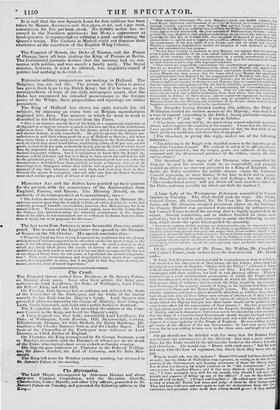'bc SlictrapaIiit. The Lord Mayor, accompanied by Alderman Harmer and about
eistptwo Common Councilmen, with the Recorder, Sheriffs, Clambe r 1 ai n, tinder Sheriffs, and other City officers, proceeded to St. James's Palace on Tuesday, and presented the following address to the King " Most Gracious Sovereign—We, your Majesty's loyal and dutiful subjects, the Lord Mayor, Aldertneu, and Commons of the City of kondoo, in Common Couwil ate sembled, humbly iepreseut to yonr Majesty that we feel deeply grateful to jou Majesty for havik In your gracious avers:hes Prom the Throne recommended, mad after. wards approved and sanctioned. the great measure of Parliamentary Reform : and es. 'weirdly for your Majesty's most gracious declaration in answer to the addiess of this Court qn the lath day of October 1531, that we might be assured of your Majesty, sincere desire tc, aphid and to improve the secuttities afforded by the Constitution for the mainteuanee of the just rights of your People, and that we might rely ou %Mr Majesty's eetititIlled diS1106iti011 to further the adoption of such measures ass might seem best calculated for that purpose. " We beg leave humbly to represent to your Majesty, our opinion that the security of the Crown, the stability of our most valued institutions, and the permanent pros. perity of the country, can Lolly be maintained by a steady perseverance iti those salutary improvements which the country requires, and upon the attaiument of which we have tilos been led to rely with hope and confidence. " That whilst we respectfully acknowledge the constitutional prerogative of your Majesty to nominate as sour •Miuisters those whom your Majesty may approve, we carnet hut avail ourselves of our constitutional anal equally sacred right, to express ! to your Majesty our deep sorrow, that the hopes which your Majesty hail raised and strengthened have been dispelled by the reappointment of Ministers who have ever opposed the great measure of Parliamentary Reform ; and we feel bound in duty to ourselves and to our country to declare to your Majesty, that we cannot feel cettlidnre that the legititnate consequences of that Act will be faithfully prosecuted by men who in every stage denounced anti opposed it, notwithstanding the recommendation ,ind sanction which it received from your Majesty. That we can expect no correction of abuses in our social and tailitical institutions from those %hose voice has uniformly been raised in defence of those aliases; and we cannot but express our humble awl earnest hope, that the affairs of this country may be committed to the conduct et Ministers possessing the affections ;inti confidence of the People, whose wellbeing :ma happiness are necessarily involved in the appointments,' The Recorder having finished reading this address,, the Duke of Wellington handed the written answer to his Majesty ; who read it in a tone of reproof (according to the Globe), laying particular empleeis on the words "I" and " my." It was as follows.
" It has been, aud ever will be, the object of my earnest solicitude to correct abuses, and to improve time condition of the country. I trust that the Minister, I may appoint will, by the successful prosecution of this the first wish of my beat t, justify my confidence, and obtain that of my people."
[ The Standard, in giving this reply, makes use of the following language- " The following is the King's trimly dignified answer to the impertinent ad- dress of the Common Council. The animals to wham it is olFrcd will pro- bably not understand it ; but the temper, grace, and calmness of the reply, compared with the ill-manta:red petulance of the address, convey the most cutting rebuke."
The Standard is the organ of the Dictator, who counselled his Majesty to give his evasive reply to as respectfully and properly worded an address as ever was presented to a King of -England. No doubt, the Duke considers the middle classes, whom the Common Council represent, as mere brutes, fit for him to kick and to spurn. The .Standard gives utterance to his real feelings; but the People, " like o'erburdened asses," will yet throw off such merciless riders as the Duke, and may possibly try which can kick the hardest.]




















 Previous page
Previous page